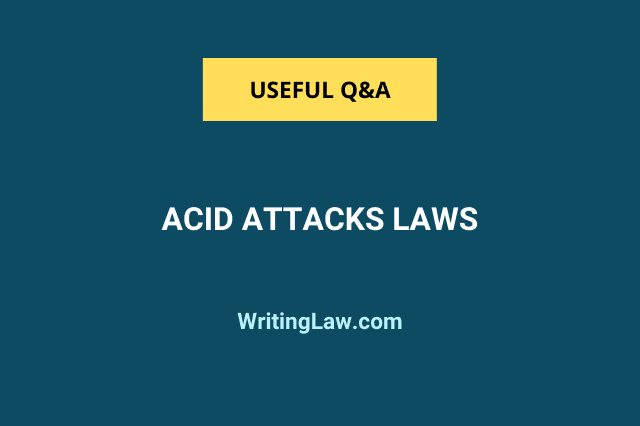
An acid attack is an act of throwing acid on any person with the intent to cause harm or injury or to kill. The person throwing acid does this act due to anger, hatred and jealousy. Mentally unfit people can also perform these acts onto someone.
Act of throwing acid can cause physical harm such as burn marks, blindness and other injuries. Throwing acid also results in physical, psychological as well as societal harm.
Given below are four laws related to acid attacks in India:
1. Section 326A of the Indian Penal Code, 1860, deals with voluntary causing permanent or partial damage, deformity, disfigures, burns, disables by use of acid. The minimum punishment under this section is imprisonment for 10 years, which may be extended to imprisonment for life and fine, which should be as per the victim’s medical expenses.
2. Section 326B of the Indian Penal Code, 1860, deals with voluntarily throwing or attempting to throw acid with the intention to cause harm. The person will be punished with a minimum imprisonment of five years which can be extended up to seven years and a fine.
3. Section 357A of the Criminal Procedure Code deals with a general clause on compensation scheme to the victims who have suffered any loss or injury, and the court, after the conclusion of the trial, passed an order directing the accused to pay compensation.
Under this section, it is directed to every State Government in coordination with the Central Government to prepare a scheme for providing funds to the victims or their dependents who have suffered any loss or injury.
Under this section, the court can recommend District Legal Services Authority or the State Legal Services Authority to decide the quantum of compensation that is to be provided to the victim.
Under this section, if the trial court thinks that the compensation provided is not satisfactory, then they can make a recommendation for compensation.
In cases where the victim is identified but the trial did not take place due to the offender not being traced or identified, the victim or his dependents are authorised to make an application before the State or District Legal Services Authority for an award of compensation. Also, the authorities are directed to sanction compensation to the victims after proper inquiry and verification.
This section also directs the State or District Legal Services Authority to make medical expenses free of cost for the victim’s treatment.
4. As per section 357C of the Criminal Procedure Code, 1973, all the local, public, private hospitals are directed to provide free of cost emergency first aid to the victims.
All the above sections are related to the heinous crime of throwing acid. The Indian Government should make sure that these laws are implemented properly for the safety of victims and their dependents.
- What Are the Rights of Private Sector Employees in India? - 4th April 2023
- Is an Unmarried Woman Legally Allowed To Have an Abortion in India? - 27th June 2022
- What Are the Two Main Schools and Four Sub-Schools Under Hindu Law? - 27th April 2022







